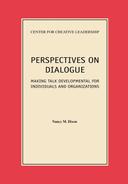Perhaps like many authors, I have written this as much for myself as I have to communicate my ideas to others. For me writing has often been a way to clarify my own thinking or to make sense of a difficult issue with which I am wrestling. Dialogue fits well into my category of difficult issues.
I have been struck by the enthusiasm people express for dialogue. Over the last few years dialogue groups have formed around the country and dialogue seminars have sprung up. The term “dialogue” is now frequently heard when the speaker wants to convey that the discussion will be in greater depth or will be more real than usual. Yet, as I listen to conversations between organizational members or sit in meetings in organizations, I hear very little that I would call dialogue going on. It is the near absence of something we seem to find so appealing that perplexes me. Is it that we lack the skills to have a dialogue? Do we need more training courses in listening or communication? Or do we already know how to dialogue but are constrained by the organizations in which we function so that we are unable to do what we know how to do? I have resided on both sides of that quandary.
On the “we lack the necessary skills” side, I have given courses that teach Argyris’ Model II skills for many years at the university. Although the skills are difficult to learn and can, at times, be very frustrating, these courses are, without doubt, the ones my students say they find most valuable. They learn a set of skills that they say impact not only their work life, but their personal life as well. I have been intrigued by the way change happens in those learners. They make a significant change not when they have mastered the technique, which can take up to a year, but when they have internalized the values represented in the technique. The skills themselves are like a door that allows them to reach the values.
On the side of “it’s the situation that constrains us,” for many years I led Great Books discussion groups. We didn’t teach skills in how to dialogue in Great Books, but there were some strict rules we followed in those discussions such as: no one could talk unless he or she had read the book we were discussing; no one could reference an outside authority, we all spoke only from our own understanding of what we had read; the leader, who framed the questions under discussion, was limited to asking questions for which she truly had no answer herself. Those rules, and others, created the conditions which allowed a rich and meaningful dialogue to take place.
Having experienced both sides of the conundrum without finding a satisfying resolution, I have returned to many of the theorists who have influenced my thinking about dialogue to look for answers. As you will read, what I have come away with is a reframing of the issue that is based more in the way we relate to each other than with either our skill level or the conditions under which we employ them.
